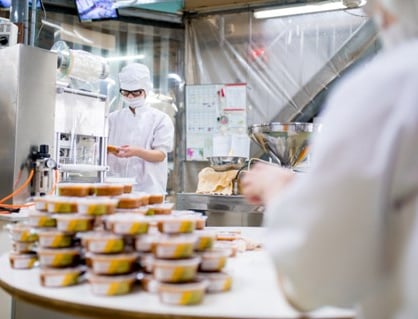
MB „June.lt“ – a consulting company staffed with highly qualified specialists who have extensive experience in the field of food safety. We are committed to supporting your business growth and ensuring compliance with all legal requirements and international standards. Our mission is to help companies implement the highest food safety standards so that their customers can enjoy safe and high-quality products.
Food Safety and Consulting

Our Services
Food Business Operator Registration
The registration of a food business operator is the granting of the right to conduct food handling activities after the operator is included in the Food Business Operators List/Register managed by the State Food and Veterinary Service (hereinafter referred to as SFVS) and is assigned an identification number.
How to Start Food Production in a Home Kitchen
Planning to start a food production business from your home kitchen? Preparing and selling food directly to consumers is an attractive opportunity, but it requires compliance with legal regulations and food safety standards. We will help you ensure that your operations meet all legal requirements, from kitchen preparation to documentation management and business registration.
Feed Business Operator Registration
We offer full-scale consulting and support services for feed business operators aiming to comply with legal requirements and successfully register their activities with the State Food and Veterinary Service (SFVS).
Development of the HACCP System
The Hazard Analysis and Critical Control Points (HACCP) system is a science-based system designed to identify specific hazards and implement control measures to ensure the safety and quality of food products.
Quality Management Systems
The International Organization for Standardization (ISO) standards help organizations ensure the consistency of goods and services as well as operational efficiency across various areas, including food safety. ISO standards cover a wide range of fields, from quality management (ISO 9001) to environmental protection (ISO 14001) and food safety (ISO 22000).











A food business operator seeking the right to engage in food production activities must contact the respective Regional Services Division of the SFVS Services Department in the area where the food handling activities are planned and provide the following:
An application in the prescribed form for the approval/registration of the food business operator;
A layout plan of the food handling premises (facilities) indicating the placement of equipment;
A description of the food handling process in the prescribed form;
Documents confirming that a self-control system based on the principles of Hazard Analysis and Critical Control Points (HACCP) has been implemented in the establishment, or that specific Good Hygiene Practices (GHP) relevant to the food handling sector are applied;
A copy of the document confirming the right to use the food handling premises where the planned food handling activities will take place.
The decision on the registration of a food business operator seeking to engage in food handling activities is made no later than within 5 or 10 working days (depending on the intended activity). The timeframe is calculated from the day all the documents specified in the description are submitted.
Food Business Operator Registration

Our consulting services cover requirements related to feed handling activities, including:
Preparation and completion of documents in accordance with established forms;
Guidance on ensuring compliance with EU and Lithuanian legislation regulating feed production, supply, and safety;
Development and implementation of feed safety systems based on the principles of Hazard Analysis and Critical Control Points (HACCP).
Feed Business Operator Registration
Feed business operators intending to produce and/or supply feed materials, excluding primary production (abbreviated activity types FM-P, FM-S), must submit the following documents to the territorial Services Department of the State Food and Veterinary Service (SFVS) for activity registration:
Completed application form in the prescribed format;
Copies of business license or registration documents, such as a business license for a natural person or a farmer's registration certificate;
Documents proving lawful use of premises or territory (e.g., property ownership certificates, lease agreements, loan-for-use agreements, etc.), if the activity involves premises and/or equipment;
List of feed materials to be produced or supplied;
Schematics of production and storage premises, territory, and equipment;
Description of the technological production process (applicable only for feed material production activities);
Cleaning and disinfection program for premises, territory, equipment, and transport;
Self-control system program, including the HACCP-based system (if applicable);
Sampling plan for self-monitoring (applicable to feed material production and wholesale activities);
Pest control program;
Waste management program;
Details about personnel qualifications and assignment of responsibilities;
Information on the implemented feed traceability system;
Complaints handling and product recall program;
Unsafe feed management program.
Feed business operators planning to import feed into the Republic of Lithuania (abbreviation of feed activity type: I) must submit the following documents to the territorial Services Department of the State Food and Veterinary Service (SFVS) for activity registration:
A completed application form;
A copy of the individual business license or a copy of the farmer's registration certificate (if applications are not submitted through PŪSR);
A list of imported feed;
A list of representatives in the European Union for manufacturers of imported feed additives, premixes, and compound feed produced in third countries;
Information about the feed accounting (traceability) system;
A complaints handling and product recall program;
A program for managing unsafe feed.

Requirements for Home Kitchens
Food business operators producing and supplying food in small quantities directly to final consumers must operate in accordance with the Requirements for Handling Food Produced and Supplied in Small Quantities to Final Consumers, approved by the Director of the State Food and Veterinary Service on September 4, 2019, by Order No. B1-649 “On the Approval of Requirements for Handling Food Produced and Supplied in Small Quantities to Final Consumers.” When producing food at home, it is also necessary to comply with the requirements of legal acts regulating food safety and hygiene.
In a home kitchen, it is possible to carry out one of the following activities:
Bakery and flour-based product production, or
the preparation of ready-to-eat meals and dishes.
Required conditions include:
Sufficient space for conducting food handling activities;
Adequate storage space for raw materials, prepared food products, food packaging, and inventory under appropriate conditions;
Floors, walls, and ceilings must have smooth surfaces and be made of moisture-resistant materials;
Food handling areas must be tidy, free of pests and their traces, and without the presence of household pets. If pets are present, measures must be in place to prevent their access to food handling areas;
Hot and/or cold potable water supply must be ensured in food handling areas.
Storage and Warehousing
Food products and raw materials intended for final consumers must be stored separately from household food items, for example, on a designated shelf, ensuring the storage conditions specified by the manufacturer;
Domestic refrigerators must maintain a temperature of no more than 6 °C, and freezers must not exceed −18 °C;
Raw meat, poultry, or fish should be stored at the bottom of the refrigerator, while ready-to-eat food should be stored at the top.
Cooking with Fats
If food is fried in fats used across multiple batches, specific tests (using test strips) must be performed to determine the free fatty acid content. The free fatty acid concentration in the fat must not exceed 2.2%. If this limit is exceeded, the fat is considered unsuitable for use and must be removed from the production process.
Traceability
You must ensure the traceability of food products and raw materials used in production and retain their purchase documents. These documents should include information on the best-before date or batch number, as well as other critical details, such as the product name, quantity, batch number, purchase date, and document number. Produced and sold food quantities must also be recorded. All documents required for traceability must be retained for at least six months.
Cross-contamination Prevention
Cross-contamination is one of the most significant risks during food production. The kitchen must be set up to ensure the separation of raw materials from the final product. Use separate tools (e.g., cutting boards, knives) for raw meat, vegetables, and ready-to-eat products.
Cleaning and Disinfection Procedures
All surfaces and tools used for food preparation must be regularly cleaned and disinfected to prevent the spread of bacteria. Use authorized biocidal products specifically intended for cleaning and disinfection. Surfaces must be cleaned and disinfected after every food preparation process according to established procedures.
Personal Hygiene
Key requirements include maintaining personal hygiene, such as wearing clean work clothing and regularly washing hands. Anyone handling food must have a valid health check certificate permitting them to work with food. Additionally, they must have completed a hygiene skills training program.
Individuals suffering from infectious diseases or displaying symptoms that may pose a risk to food safety, such as diarrhea, vomiting, fever, sore throat, or unhealed skin wounds, are prohibited from handling food.
Submission of Applications and Descriptions
To register your activity, you will need to submit a formal application and description to the relevant regional State Food and Veterinary Service (SFVS) department. The application should provide detailed information about the planned production process, kitchen equipment, layout, and the intended food products.
Conclusion
Starting a home-based food production business is an excellent way to turn your passion into a profession. However, it is crucial to ensure that your activities comply with food safety and public health requirements. We are here to assist you and ensure that the entire process runs as smoothly as possible while meeting legal regulations.
